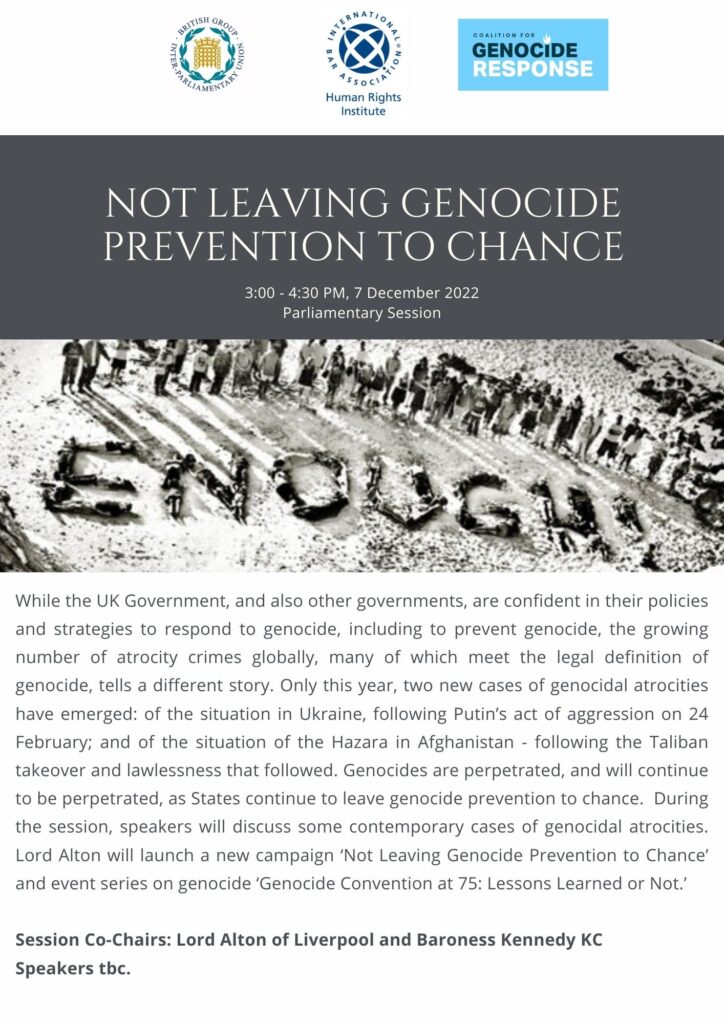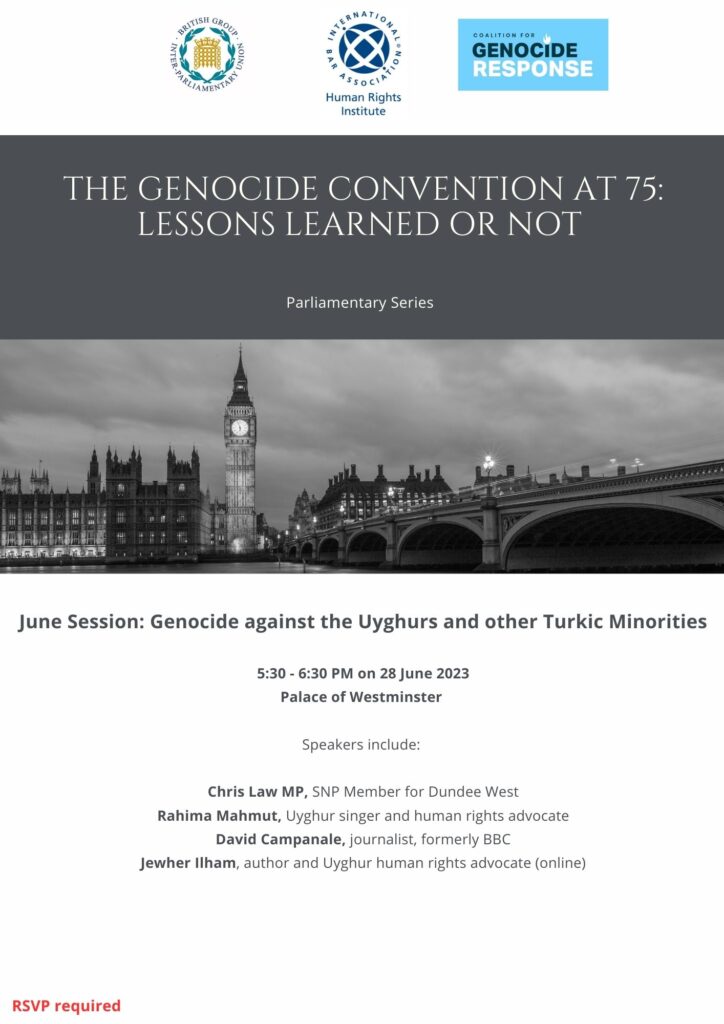
Parliamentary Session: Genocide against the Uyghurs and other Turkic Minorities


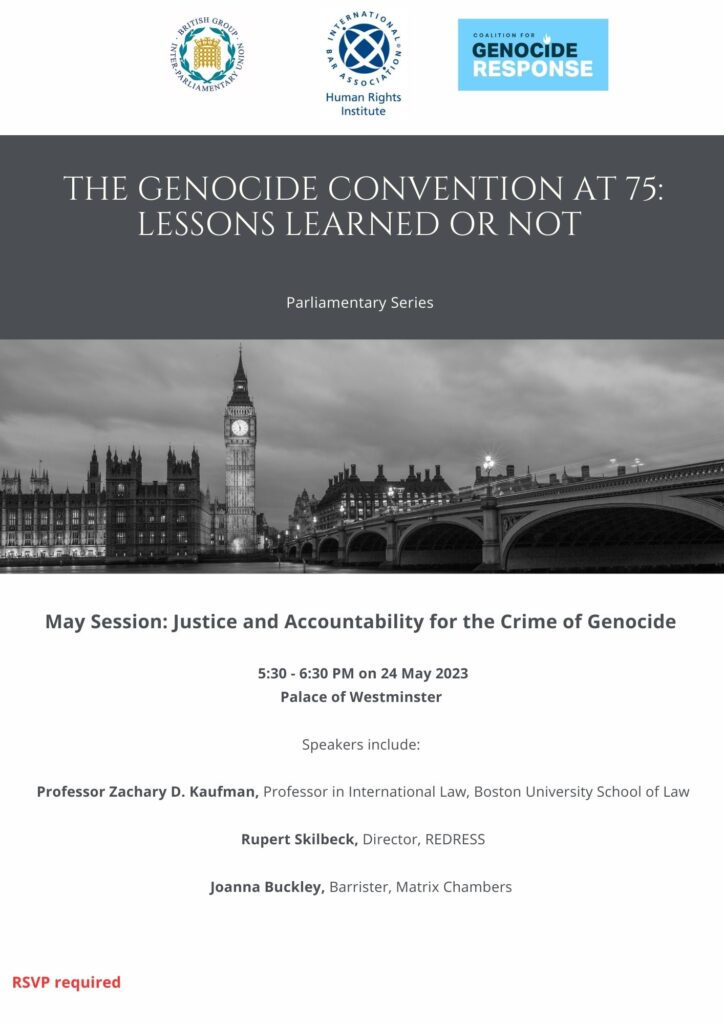
On 25 April 2023, the Inter-Parliamentary Union, the International Bar Association’s Human Rights Institute and the Coalition for Genocide Response will host a Parliamentary session on ‘Past Atrocities and the Risk of Future Atrocities – Rwanda, Bosnia, Darfur, Iran.’
Speakers include:
Baroness D’Souza, House of Lords
Rebecca Tinsley, President and Founder of Waging Peace
survivors of the atrocities:
Safet Vukalic BEM and Antoinette Mutabazi
and
Nazanin Boniadi, actress and human rights defender
RSVP is required.
On 28 March 2023, the Coalition for Genocide Response is co-hosting a Parliamentary session on the need to establish an ad-hoc tribunal for Putin’s crime of aggression. More information is below.
In the year leading to the 75th anniversary of the Genocide Convention, the British Group Inter-Parliamentary Union, the International Bar Association’s Human Rights Institute, and the Coalition for Genocide Response will host a series of Parliamentary events engaging with several issues pertaining to the implementation of the duties under the Genocide Convention and look at recent and contemporary cases of genocidal atrocities.
February Session: Putin’s War on Ukraine – One Year of Atrocities and the Question of Genocide
5:30 – 6:30 PM on 21 February 2023
IPU, Palace of Westminster
Chair: Rt Hon Sir John Whittingdale OBE MP
Speakers include:
Ambassador Vadym Prystaiko, Ukraine’s Ambassador to the UK
Azeem Ibrahim, Director, New Lines Institute
Nataliia Visnevska, Ukrainian citizen, resettled to the UK in 2022
Baroness Helena Kennedy KC, Director of IBAHRI, and Hannah Rose Thomas, an artist working with Ukrainian refugees, will also intervene during the session and provide some comments.
RSVP required.
24 February is the anniversary of Russia’s invasion of Ukraine.
Over the last year, millions of Ukrainians have fled their homes, thousands of civilians have been killed, and vital infrastructure has been destroyed.
Acts of aggression – like invasion, attack, and occupation – are proscribed by international law. If intentionally committed by senior leaders, these acts constitute the crime of aggression. This is the same crime that the post-Holocaust Nuremberg Tribunal termed the ‘supreme international crime’. It is from the crime of aggression that other international crimes in conflict settings – war crimes, crimes against humanity and genocide – often flow.
Today, we have an opportunity to repeat the ‘1945 moment’ – by creating a special tribunal to investigate these acts of aggression and hold Russian political and military leaders to account.
Support for a special tribunal has been steadily growing since it was first proposed by Professor Philippe Sands KC days after Russia invaded Ukraine:
We will hear from two experts with particularly valuable insights into this crucial issue:
Event organised by René Cassin and the Coalition for Genocide Response.
RSVP: https://www.eventbrite.co.uk/e/ukraine-how-the-law-can-hold-putin-to-account-tickets-529333549897
On 19 January 2022, experts and civil society representatives sent a letter to Prime Minister calling upon him to recognise the Daesh atrocities against the Yazidis, Christians and other religious or belief minorities in Syria and Iraq as genocide.
The Daesh atrocities have been recognised as genocide by the Parliamentary Assembly of the Council of Europe, the European Parliament, the US State Department, the Canadian and Dutch governments, and several parliaments, including the UK House of Commons.
The UK Government refused to recognise the atrocities as such hiding behind its ‘long-standing policy’ of leaving the question of genocide determination to the courts.
18 January 2023
Dear Prime Minister,
We, the undersigned, call upon you to formally recognise the Daesh atrocities against the Yazidis, Christians and other religious or belief minorities in Syria and Iraq as genocide.
We understand that it is a long-standing policy of the UK Government not to make determinations of genocide but to leave it for competent courts. As flawed as this policy is, and noting it is contrary to duties owed by the UK under the UN Convention on the Prevention and Punishment of the Crime of Genocide (the Genocide Convention), the UK Government has been standing by it for decades.
On 30 November 2021, a criminal court in Frankfurt, Germany, convicted an Iraqi national for his involvement in genocide, crimes against humanity and other crimes. This was followed by further convictions. On 27 July 2022, the Higher Regional Court of Hamburg convicted German Daesh member Jalda A. of aiding and abetting genocide as well as of crimes against humanity and war crimes for the enslavement and abuse of a young Yazidi woman.
As such, the courts put the evidence of the Daesh atrocities to detailed legal scrutiny, applying relevant international law, and recognised the atrocities as genocide.
A criminal court, in the view of the UK Government, is a competent court to make such a determination. Also, criminal courts in Germany are some of the world’s most respected criminal courts to deal with issues of international crimes, particularly under the principle of universal jurisdiction.
Following the findings of genocide by German courts, we call upon the UK Government to formally recognise the atrocities committed against the Yazidis, Christians and other religious or belief minorities in Syria and Iraq as genocide.
We look forward to hearing from you as a matter of urgency.
Yours sincerely,
Organisations
Accountability Unit
A Demand for Action
Coalition for Genocide Response
Free Yezidi Foundation
International Bar Association’s Human Rights Institute
Yezidi Emergency Support. (Y.E.S). UK
Individuals
Aarif Abraham, barrister, Garden Court North Chambers
Lord Alton of Liverpool, Member of the House of Lords
Andy Bailey, Director, APPG on Genocide and Crimes Against Humanity
Peter Burns, Executive Director, IRF Summit
Christopher Cocksworth, Bishop of Coventry
Andrew Copson, Chief Executive, Humanists UK
Rt Hon Baroness D’Souza CMG, Member of the House of Lords
Ryan D’Souza, Curator, ‘Nobody’s Listening: Forgotten Voices of Sinjar’ Virtual Realty Exhibition
Dr Tatyana Eatwell, barrister, Doughty Street Chambers
Emily Foale, Project Manager, IBAHRI
Lord Hannay, Member of the House of Lords
Mia Hasenson-Gross, Executive Director, Rene Cassin
Lord Hunt of Kings Heath, Member of the House of Lords
Prof Azeem Ibrahim OBE, Director, New Lines Institute
Baroness Kennedy of The Shaws, Member of the House of Lords, Director of the IBAHRI
Nadine Maenza, President, IRF Secretariat
The Lord McInnes of Kilwinning, Member of the House of Lords
Anne Norona, Founder of Yezidi Emergency Support. (Y.E.S). UK
Dr Ewelina Ochab, Programme lawyer, IBAHRI, Coalition for Genocide Response, co-founder
Brendan O’Hara MP, Chair of the APPG on the Yazidis
Kirsten Oswald MP, Officer of the APPG on International Freedom of Religion or Belief
Prof. John Packer, Neuberger-Jesin Professor of International Conflict Resolution and Director, Human Rights Research and Education Centre, University of Ottawa
Emily Prey, Director, New Lines Institute
Benedict Rogers, Deputy Chairman, Conservative Party Human Rights Commission
Jim Shannon MP, Chair of the APPG on International Freedom of Religion or Belief
Mervyn Thomas CMG, Founding President, Christian Solidarity Worldwide
Yasmin Waljee OBE, Partner, International Pro Bono, Hogan Lovells International LLP
Dr Aldo Zammit Borda, Reader in International Law, City, University of London
In the year leading to the 75th anniversary of the Genocide Convention, the British Group Inter-Parliamentary Union, the International Bar Association’s Human Rights Institute, and the Coalition for Genocide Response, will host a series of Parliamentary events engaging with several issues pertaining to the implementation of the duties under the Genocide Convention and look at recent and contemporary cases of genocidal atrocities.
The January Session on ‘The Holocaust and the Promise of Never Again‘ will take place at 5:30 – 6:30 PM on 18 January 2023 in the Palace of Westminster.
Speakers include:
Lord Dubs, Peer at the UK House of Lords
Dorit Oliver Wolff, Holocaust survivor, advocate, singer
Olivia Marks-Woldman, Chief Executive, Holocaust Memorial Day Trust
Mia Hasenson-Gross, Executive Director, Rene Cassin
RSVP required.
Refreshments will be served after the session.
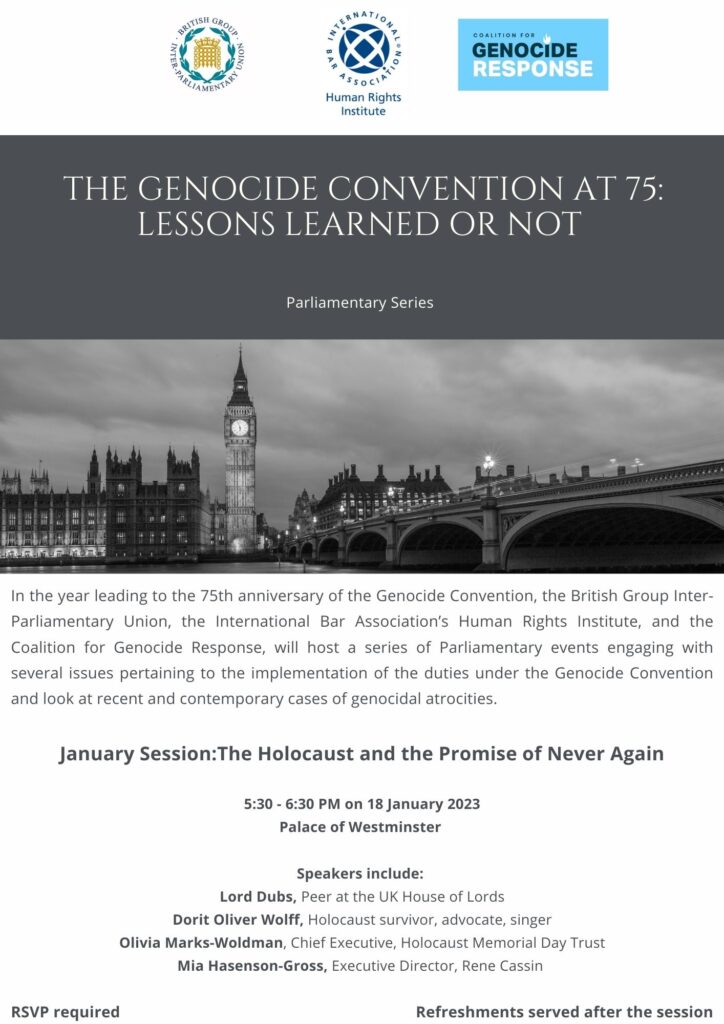
As we approach 75th anniversary of the UN Convention on the Prevention and Punishment of the Crime of Genocide (Genocide Convention), it is crucial to pause and consider the lessons learned (or not learned) and how to improve the legacy of the treaty that was meant to deliver on the promise of ‘Never Again.’
In the year leading to the 75th anniversary of the Genocide Convention, the British Group Inter-Parliamentary Union, the International Bar Association’s Human Rights Institute, and the Coalition for Genocide Response, will host a series of Parliamentary events engaging with several issues pertaining to the implementation of the duties under the Genocide Convention and look at recent and contemporary cases of genocidal atrocities.
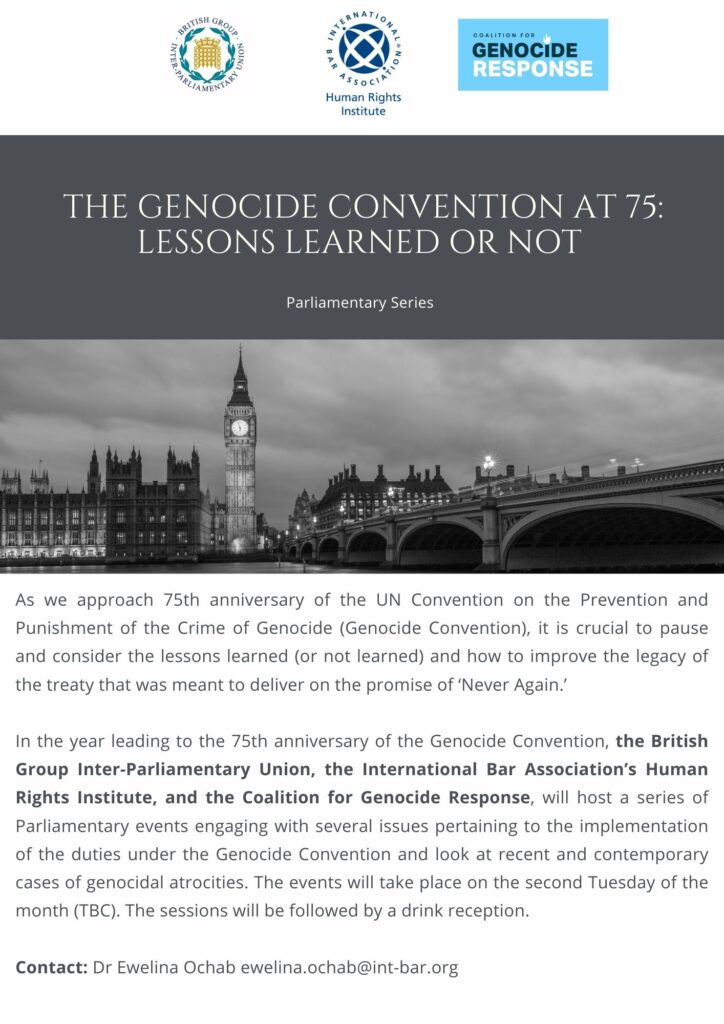
Planned sessions:
January 2023 – Holocaust and the Promise of Never Again
February 2023 – Putin’s War on Ukraine – One Year of Atrocities and the Question of Genocide
March 2023 – The Duty to Prevent Genocide and the Serious Risk of Genocide
April 2023 – Rwanda, Bosnia, Darfur — Past Atrocities and the Risk of Future Atrocities
May 2023 – Justice and Accountability for the Crime of Genocide
June 2023 – Genocide Against the Uyghurs and other Turkic Minorities
July 2023 – The Serious Risk of Genocide in Tigray
August (in July or online in August 2023) – The Daesh Genocide and the Missing 2,700 Women and Chilren
September 2023- Genocide Against the Rohingyas
October 2023 – Calls for the Annihilation of Muslims in India
November 2023 – The Denial of Genocide and the Cost of Doing Nothing
December 2023 – 75th Anniversary – Towards Comprehensive Mechanisms for Implementation of the Duty to Prevent and Punish the Crime of Genocide
While the UK Government, and also other governments, are confident in their policies and strategies to respond to genocide, including to prevent genocide, the growing number of atrocity crimes globally, many of which meet the legal definition of genocide, tells a different story. Only this year, two new cases of genocidal atrocities have emerged: of the situation in Ukraine, following Putin’s act of aggression on 24 February; and of the situation of the Hazara in Afghanistan – following the Taliban takeover and lawlessness that followed. Genocides are perpetrated, and will continue to be perpetrated, as States continue to leave genocide prevention to chance.
On 7 December 2022, the British Group Inter-Parliamentary Union, the International Bar Association’s Human Rights Institute, and the Coalition for Genocide Response, will host a Parliamentary session marking the International Day of Commemoration and Dignity of the Victims of the Crime of Genocide and of the Prevention of this Crime (9 December). During the session, speakers will discuss some contemporary cases of genocidal atrocities. Lord Alton will launch a new campaign ‘Not Leaving Genocide Prevention to Chance’ and event series on genocide ‘Genocide Convention at 75: Lessons Learned or Not.’
Session Co-Chairs: Lord Alton of Liverpool and Baroness Kennedy KC
Speakers tbc.
RSVP to [email protected]
